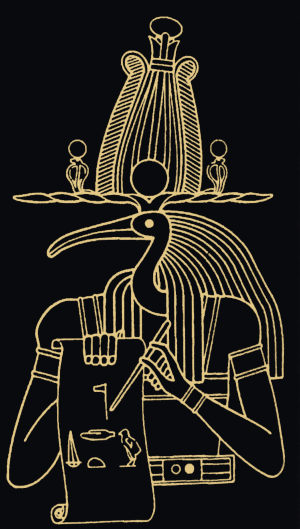This article is about my preferred Tarot deck and reading method and the consecration ritual I constructed for it based on Egyptian hymns and Demotic spells to Tehuti (Thoth).
Épiphanie
In May of last year I was on holidays in a remote town in the Provence with my extended family for a few days. Before that my wife, daughter and I spent three days in the beautiful city of Marseille. Besides visiting the black madonna called Notre Dame de Confession in the ancient Abbaye St. Victor the other occult sightseeing spot I wanted to visit was the old Camoin House. It is the building where in 1760 Nicolas Conver established his cardmaking factory and engraved his famous Tarot de Marseille, the mother of most modern Tarot decks.
The winter before, I had been obsessing about the question which Tarot deck to use for divination. I had no experience with Tarot and after some research I had bought the beautiful Smith-Waite Centennial Tarot Deck which I really loved for aesthetic reasons and because Smith-Waite decks are apparently recommended for beginners. Unfortunately it did not really resonate so much with me after trying giving it a try for a few months. The detailed imagery of the minor arcana seemed sometimes a bit too detailed and confusing to me and results were too ambiguous. So I was looking for alternatives. I did not like any of the Smith-Waite derivatives and I also found Crowley's deck very unappealing. The final contestants were the Camoin Jodorowsky Tarot de Marseille deck, the Sola Busca from Scarlet Imprint, and the Hermetic Tarot and I could not really decide on one.
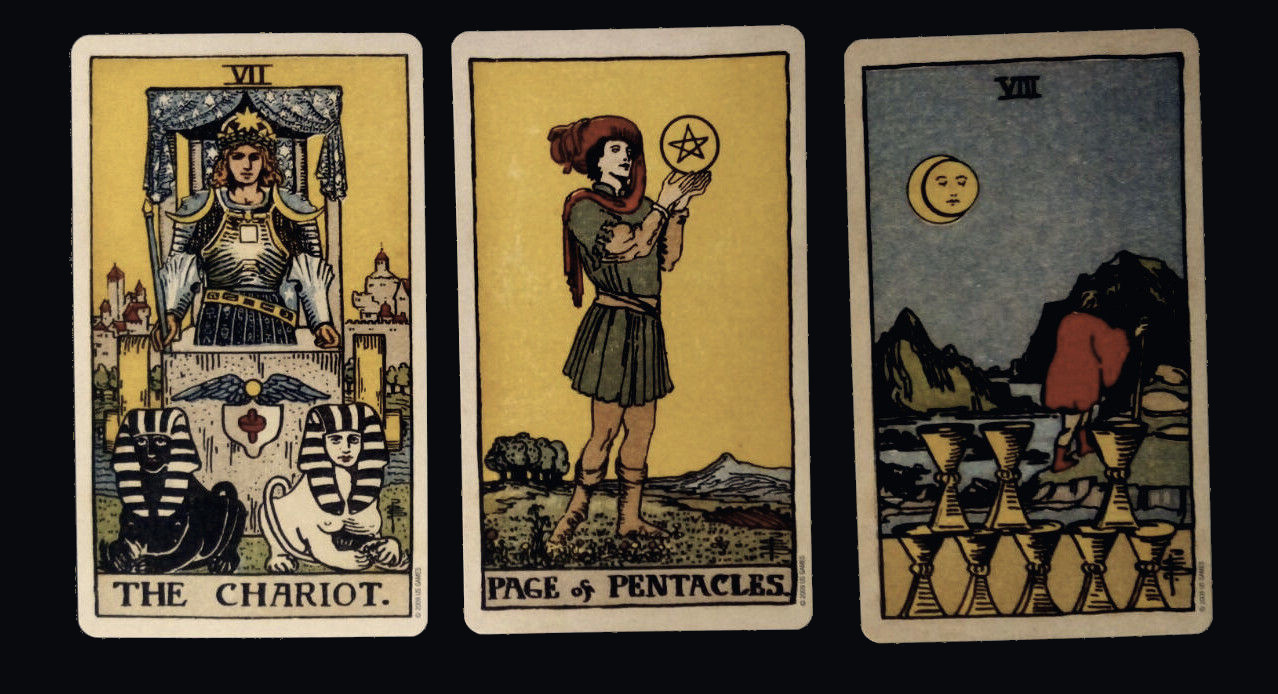
My question was answered in an uncanny way on the day we walked through the lovely district of Noailles in Marseille, a lively area with a lot of North African expats. We strolled through the Rue d'Aubagne, a lively small street with a lot of cafés and small shops, mostly selling goods and delicacies from the Maghreb. We approached a small intersection and suddenly I was overwhelmed by a strange "epiphanic" feeling of clarity. It was as if the time stood still for a moment and everything went quiet, just to continue normally after a short glimpse. It was uplifting and strange at the same time.
I checked the map to see where we were, because I knew that the old Camoin House was supposed to be in this very street. I discovered that we were standing right in front of it: Number 8! I was excited! Today it looks like a normal residential house and hosts a (delicious) Tunisian restaurant on the ground floor. Nothing points to the history of this building. I immediately knew that this strange moment was a clear hint which direction to take in my Tarot deck quest.
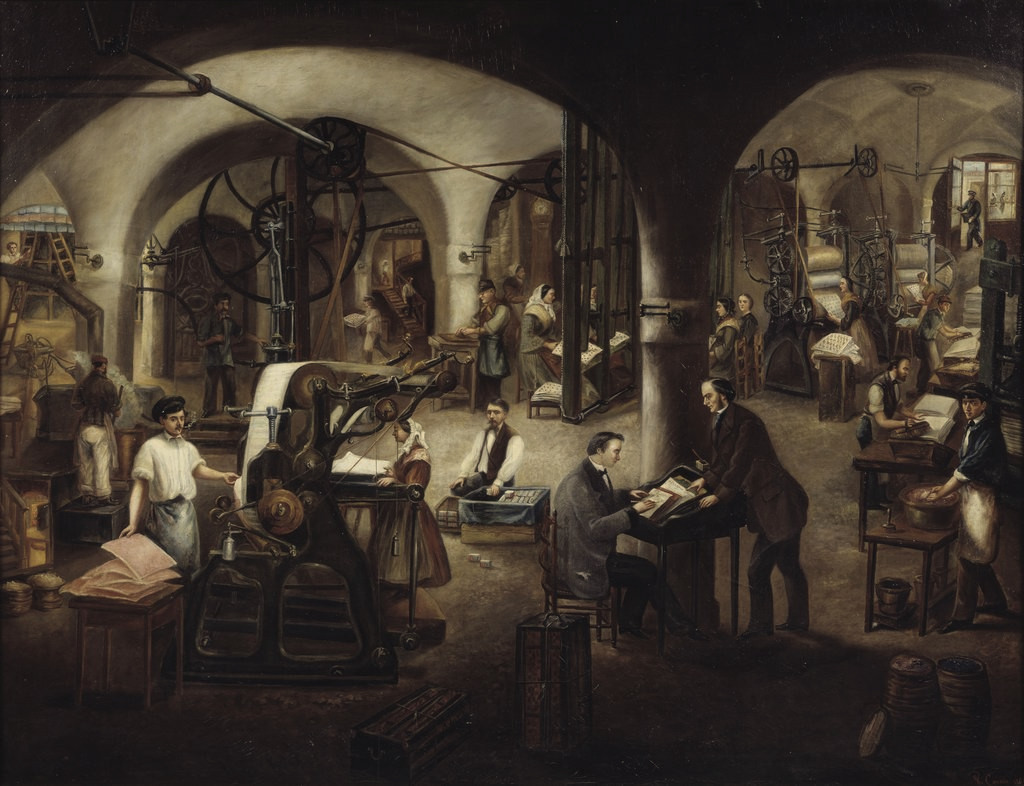
The Open Reading
After I had jumped down the Tarot de Marseille rabbit-hole and read Jodorowsky's excellent book, I soon realized that Camoin and Jodo had altered the original Conver design and had added more little occult details into it. I did not like that approach and wanted something more genuine.
Luckily, during my research I stumbled over a great little Tarot book that resonated a lot with me. It was the work of Israeli physicist and philosopher Yoav Ben-Dov who had studied Tarot and psychomagic with Jodorowsky in Paris and subsequently created his own method of reading the Tarot which ironically seems to be the complete opposite of Jodorowsky's very esoteric system:
The open reading is my way of reading the Tarot. In a nutshell, it is based on the three following points. First, a Tarot card does not have a fixed meaning which can be learned in advance. Rather, the meaning emerges from what we can see in the card. Second, the function of each position in a spread is also not fixed. Rather, it depends on the card combination. Third, we don't start by interpreting each card separately. Instead, we first try to see the whole picture.

This concept resonated very much with my idea of how divination is meant to work. He had also created a very clear and clean reproduction of the original Conver Tarot deck that looked gorgeous and immediately became my top-pick. I bought Ben-Dov's ebook on Amazon, but had to wait a couple of months until the deck became available again after having been sold out. In the meantime I downloaded the free digital version and could already enjoy the design.
Although the minor arcana cards can be a bit difficult to interpret, I resonated much more with the CBD Tarot de Marseille than with the Smith-Waite deck. Because my past attempts of reading the cards had been so ambiguous I decided that before using this new deck I would need to properly consecrate it, hoping to improve the clarity of the message.
The Beaked Scribe
An Egyptian god I have wanted to connect with for quite some time was Tehuti, most commonly known as Thoth. If you don't know much about him here is some basic information about Tehuti from the excellent Henadology website:
[Tehuti] is the God of learning and of wisdom, depicted as an ibis-headed man, as an ibis, or, less often, as a baboon (in this form generally with a lunar crescent on his head), and frequently holding the brush and palette of a scribe, since the wisdom of which he is the master is in particular that contained in sacred texts. [Tehuti] has also strong lunar associations, to the extent of being often identified with the moon itself [...], but more systematically [Tehuti] is the God responsible for healing the wedjat, the Eye of Horus, after it was injured by Seth, and since the wedjat‘s regeneration is embodied in the waxing lunar cycle, [Tehuti] is the God who restores the light of the moon. [...] [Tehuti]'s identification with the moon probably also involves an idea known to many cultures, namely that the moon, as the nocturnal sun, symbolizes the powers of the human intelligence to supplement that which nature provides and as an intermediary between the divine and mortal realms. [Tehuti] is not only the embodiment of wisdom, but also its advocate in the world: [...] [Tehuti] is also a peacemaker who reconciles Horus and Seth and who pacifies the wrathful Goddesses, especially Sekhmet. [...]
[Tehuti] facilitates the exchange across the border between the human and divine realms in his function as lord of sacred texts. [...] Re empowers [Tehuti] by a series of formulae linked to [Tehuti]'s diverse forms—the ibis, the moon, and the baboon. First, Re grants him the authority to send forth the other Gods through spells and invocations and to check their actions in turn, this power corresponding to the ibis. Next Re bids him to “encompass the two heavens with thy beauty and thy light,” this corresponding to the moon. Finally, Re charges him with traversing the lands of the Ha-nebu, the ‘Northern Lords', a vague term for the islands of the Aegean [...], perhaps implying a circuit around the Mediterranean and thus through many foreign lands—a hymn to [Tehuti] states that he “made different the tongue of one country from another,” (Bleeker 1973, 140); this last power corresponds to the baboon.
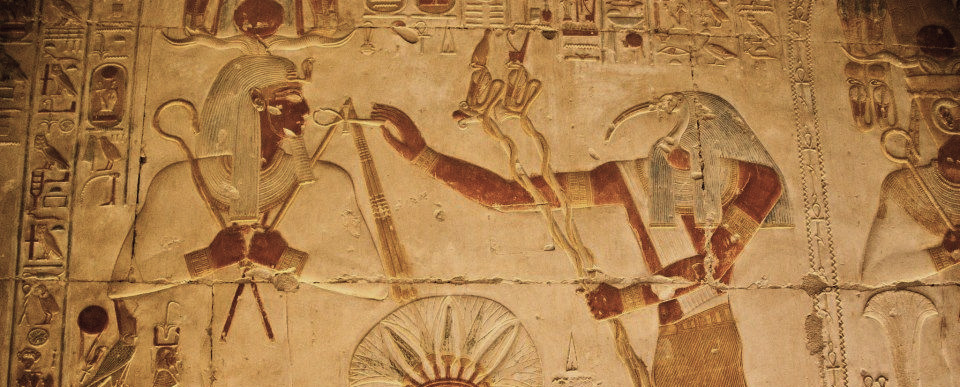
Besides being the founder of the words of speech including magical words, he also was the demiurge who created the world through utterance. He has knowledge of true names of all creation, he has the power to heal and he's a god of justice. As a lunar god he presides over the passing of time and length of every human's life. He doesn't necessarily rule over, but at least has knowledge of all fate. Therefore he also presides over divination and prophecy.
I thought it would be a great way to start a relationship with Tehuti by dedicating my new deck to him and consecrating it by his name in a proper ritual.
Invoking the Ibis
The Greeks identified Tehuti with the divine messenger and trickster god Hermes, ruler over trade, heraldry, merchants, commerce, roads, sports, and travel. The god of boundaries and the transgression of boundaries, patron of herdsmen, thieves, graves, and heralds. Like Tehuti Hermes is described as moving freely between the worlds of the mortal and divine, and was the conductor of souls into the afterlife.
Hermes is also the son of Zeus and Zeus is the only god who knows the affairs of men, all that the Moirai (Fates) give them, and all that is not destined for them. Zeus is also the only god not affected by the decisions of the Moirai, but obeyed by them.
So a suitable planetary timing for the consecration would be the hour of Mercury on a Wednesday or Thursday. I was especially paranoid about negative spiritual residue on the cards due the production process they went through. So my choice of day was Saturday because I've had some good experiences working with Kronos/Saturn to wipe and purify items.
Also it seems very fitting to Tehuti that the hour of Mercury is followed by the hour of Luna, I imagine him dwelling right on the edge of the two. I timed the consecration in a way so it would start at the end of Mercury's hour and be done in the beginning of Luna's.
I start all of my rituals with the acknowledgement of the planetary rulers by reciting a planetary prayer from the Hygromanteia and the matching Orphic Hymn. When the rite is heavily Egyptian, like this one, I put more weight to that paradigm by acknowledging the ruling Decan.
In more complex workings I also usually banish or add the Stele of Jeu as a preliminary rite, I align myself with the Axis Mundi, and so on, but this ritual is just a consecration of a deck of Tarot cards and already polyphanic enough... You could probably skip the whole beginning and just do the hymn to Tehuti and the actual consecration, but this is what I did, so I am faithfully laying it out here:
Acknowledge the Planetary Rulers
- Planetary prayer of the day.
- Orphic hymn to the planet of the day.
- Planetary prayer of the hour.
- Orphic hymn to the planet of the hour.
Use whatever set of planetary prayers you like. I took the ones from the Hygromanteia but you might as well apply the ones from the Book of Oberon, Munich Manual, whatever you prefer to work with...
You can find different versions of the Orphic Hymns. The very recent translation by Patrick Dunn flow very well in English. Or use the free ones you can find here.
Acknowledge the Decans
The Egyptians venerated and feared the baktiu (Decans), gods ruling over time and fate, signified by stars near the ecliptic that were observed to measure slices of time and to determine which decan ruled over them. I will get deeper into this topic in a series of future posts.
For now, let's acknowledge them in this working with this hymn to the Decans found at the temple of Esna, combined with an Egyptian offering formula. To find the appropriate name of the current Decan, find out the sidereal Zodiac degree you are currently in and use the table below.
(If this whole section raises too many questions and doubts, skip it. I am just adding it here, because that's what I use for "doing the usual".)
| Sign | Degree | Decan |
|---|---|---|
| Cancer | 0° - 9.9° | Wart |
| Cancer | 10° - 19.9° | Pehwi Heri |
| Cancer | 20° - 29.9° | Kenmet |
| Leo | 0° - 9.9° | Khery Kheped Kenmet |
| Leo | 10° - 19.9° | Hat Djat |
| Leo | 20° - 29.9° | Djat |
| Virgo | 0° - 9.9° | Pechwi Djat |
| Virgo | 10° - 19.9° | Djmat Heret Kheret |
| Virgo | 20° - 29.9° | Wushahti |
| Libra | 0° - 9.9° | Bekahti |
| Libra | 10° - 19.9° | Ipdjes |
| Libra | 20° - 29.9° | Sebshessen |
| Scorpio | 0° - 9.9° | Tepi-Ah Hentet |
| Scorpio | 10° - 19.9° | Heriyib Wiah |
| Scorpio | 20° - 29.9° | Septi Henwi |
| Sagittarius | 0° - 9.9° | Seshmu |
| Sagittarius | 10° - 19.9° | Sah Seshmu |
| Sagittarius | 20° - 29.9° | Kenmu |
| Capricorn | 0° - 9.9° | Tepi-Ah Semed |
| Capricorn | 10° - 19.9° | Pa-Sebah Whati |
| Capricorn | 20° - 29.9° | Semed |
| Aquarius | 0° - 9.9° | Seret |
| Aquarius | 10° - 19.9° | Sah Seret |
| Aquarius | 20° - 29.9° | Tepi-Ah Akhwi |
| Pisces | 0° - 9.9° | Akhwi |
| Pisces | 10° - 19.9° | Tepi-Ah Bahwi |
| Pisces | 20° - 29.9° | Bahwi |
| Aries | 0° - 9.9° | Khentu Heru |
| Aries | 10° - 19.9° | Khentu Kheru |
| Aries | 20° - 29.9° | Ked |
| Taurus | 0° - 9.9° | Sah Ked |
| Taurus | 10° - 19.9° | Khau |
| Taurus | 20° - 29.9° | Aret |
| Gemini | 0° - 9.9° | Remen Heri |
| Gemini | 10° - 19.9° | Tjes Ark |
| Gemini | 20° - 29.9° | Remen Kheri |
Hymn to the Decans
Reverence to you, living gods, workers in the necropolis, who shine next to the disk in the evening, who recognize the hours when you come forth from the east, who announce what happens, who keep alive and kill the rebels at their wish, who shine in the sky and shoot the two countries with flames, everybody trembles when you come forth, who the star-watchers observe in your times! Greetings, children of Re, who appear at his setting, Ennead of the primeval, when you circulate daily in your orbit, living souls of the gods, daily, when you come out of the eye of Re, Messengers in the cities and districts, who shoot arrows from your mouths at the one they see from afar, the six stars and shining ones, daily, who save their Lord from every evil thing, from the shooting of the Star Gods on this day, this month, this year, in each of your hours to this day, [come, benevolent, for which I call you, as benevolent assistants in this rite for my benefit.] (1)
I call you, ruling Decan of this decade in the sign of [CURRENT ZODIAC SIGN], the one who shines on the whole inhabited and uninhabited world. I call upon you, by your name of [DECAN NAME], glorious one, of kind heart and power supreme, to bless this operation. As you cross the skies, look down to me favourably and accept my offering for your appeasing (2): Peret kheru ta, heneket, khau kau apedu, khut nebet noferet wabet ankhet netjer im. (3)
Hymn to Tehuti
Hail to you, Moon, [Tehuti],
Bull in Khmun, dweller in Hesret,
Who makes way for the gods!
Who knows the secrets,
Who records their expression,
Who distinguishes one speech from another,
Who is judge of everyone.
Keen-faced in the Ship-of-millions,
Courier of mankind,
Who knows a man by his utterance,
Who makes the deed rise against the doer.
Who contents Re,
Advises the Sole Lord,
Lets him know whatever happens;
At dawn he summons in heaven,
And forgets not yesterday's report.
Who makes safe the night-bark
Makes tranquil the day-bark,
With arms outstretched in the bow of the ship.
Pure-faced when he takes the stern-rope,
As the day-bark rejoices in the night-bark's joy,
At the feast of crossing the sky.
Who fells the fiend,
Sunders western lightland.
The Ennead in the night-bark worships [Tehuti],
They say to him: “Hail, [Son of] Re,
Praised of Re whom the gods applaud!”
They repeat what your ka wishes,
As you make way for the place of the bark,
As you act against the fiend:
You cut off his head, you break his ba,
You cast his corpse into the fire,
You are the god who slaughters him.
Nothing is done without your knowing,
Great one, son of a Great one, who came from her limbs,
Champion of Harakhti,
Wise friend in On,
Who makes the place of the gods,
Who knows the secrets,
Expounds their words.
Let us give praise to [Tehuti],
Straight plummet in the scales,
Who repulses evil,
Who accepts him who leans not on crime.
The vizier who settles cases,
Who changes turmoil to peace;
The scribe of the mat who keeps the book,
Who punishes crime,
Who accepts the submissive.
Who is sound of arm,
Wise among the ennead,
Who relates what was forgotten.
Counselor to him who errs,
Who remembers the fleeting moment,
Who reports the hour of the night,
Whose words endure forever,
Who enters duat, knows those in it, (4)
Hermes, lord of the world, who're in the heart,
O circle of Selene, spherical
And square, the founder of the words of speech,
Pleader of justice's cause, garbed in a mantle,
With winged sandals, turning airy course
Beneath earth's depths, who hold the spirit's reins,
O eye of Helios, O mighty one,
Founder of full-voiced speech, who with your lamps
Give joy to those beneath earth's depths, to mortals
Who've finished life. The prophet of events
And Dream divine you're said to be, who send
Forth oracles by day and night; you cure
All pains of mortals with your healing cares. (5)
Consecration
Light some suitable incense for cleansing, like Styrax Benzoin, Frankincense or Sage. Open the deck of cards and shuffle them in the incense smoke. Let the smoke purify the cards thoroughly while reciting the following:
Hither, O blessed one, O mighty son
Of Memory, who brings full mental powers,
In your own form both graciously appear
And graciously [consecrate these cards for me],
A pious man, [NAME], son of [YOUR MOTHER'S NAME]
That I may comprehend you by your skills
Of prophecy, by your own wond'rous deeds.
I ask you, lord, be gracious to me and [cleanse
These cards from all past influences,
([With the purifying powers of Kronos,])
And graciously consecrate these cards for me.] (5)
When I call to you, O [Tehuti], the hearing-ear,
Who listens to everything,
In your names which are great, which are divine,
ALIPS, THABLIPS, STSILIPS,
GAGARPAOTHAR, THANASIMA, QHAH,
ORTHOMENKHROÔN, BALSA, ALABAKHABEL,
HEFKAE, HEPKA, HEBIKE, NEKHEPKAI
Without deceit prophesy to me [through these cards,
At any place and any time come to me and tell me,
An answer to everything, truly, without falsehood therein]. (6)
Sources
-
(1) Inscription from the temple of Esna translated by me into English from the German translation I found in Alexandra von Lieven's "Der Himmel über Esna: eine Fallstudie zur religiösen Astronomie in Ägypten am Beispiel der kosmologischen Decken-und Architravinschriften im Tempel von Esna" in Vol. 64. Otto Harrassowitz Verlag, 2000. Page 43.
-
(2) borrowed bits from Julio Ody's essay on his attempt to work Paul Huson's Mastering Witchcraft Vassago operation
-
(3) Common Egyptian offering formula. It translates to: "A voice offering of bread, beer, a thousand of beef and fowl, and every good and pure thing on which a god lives"
-
(4) Adoration of Thoth, inscribed on a statue of Haremhab, a royal scribe and general of the army under Tutankhamun.
-
(5) from PGM V. 370-446 in Betz, Hans Dieter, ed. The Greek magical papyri in translation, including the Demotic spells. Vol. 1. University of Chicago Press, 1996. pg. 108.
-
(6) translation from demotic spells with secret names of Tehuti from Louvre E 3229 papyrus (Betz PDM lxi. 63-78 and PDM Suppl. 149—62) found in (5) pg. 288 and 328.
Consulting the Book of Tehuti
Everytime I have a need to consult with Tehuti through the Tarot, I take the deck out of its box and shuffle the cards. While I am doing that I envision the Ibis-headed god shuffling the cards through me and I speak the following invocation:
I call to you, O Tehuti, In your names which are great, which are divine, ALIPS, THABLIPS, STSILIPS, GAGARPAOTHAR, THANASIMA, QHAH, ORTHOMENKHROÔN, BALSA, ALABAKHABEL, HEFKAE, HEPKA, HEBIKE, NEKHEPKAI, Show me the truth by these cards.
Then I speak out the desired way of consulting with him: the number of cards to be used and if they are more than one I define what their positions represent. For example:
- "Using one card, answer my following question..."
- "Using two cards, representing the two choices I have concerning ... tell me what to expect"
- "Using three cards, representing from left to right: the past, the present, and the future, answer me concerning..."
After, I shuffle a bit more until I have the feeling that I need to stop and lay the agreed number of cards down in front of me. I interpret them intuitively using Ben-Dov's Open Reading method.
In addition I check the common interpretations found in the usually frowned upon little white book that comes with the deck and treat it like a "second layer" on top of my initial intuitive interpretation to see the bigger picture.
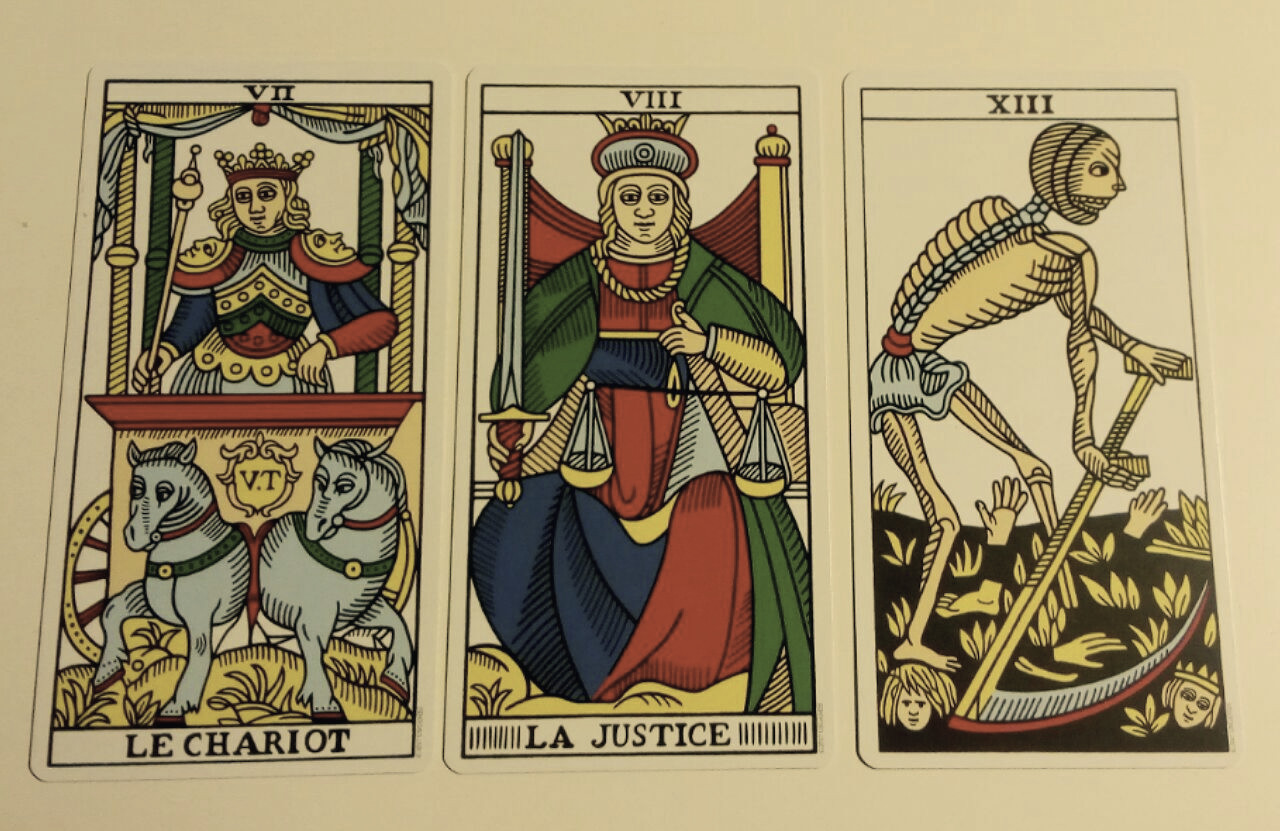
Skype with the Scribe
After the ambiguous experiences I had had before, using the Smith-Waite deck, consulting this Tehuti consecrated CBD Tarot feels like a crystal-clear, Dolby Surround, Full-HD, video-conference uplink directly to the Ibis-headed god. So far I've always had mind-blowing readings with very straight-forward answers. But I have to admit that I only read for myself and not for others. I will still have to try that out. After initial doubts I know fully trust my Tarot and almost treat it like an intimate companion. It travels with me most of the time. Sounds cheesy? Yeah it does! I didn't expect such a strong link to happen at all, it just did.
Tehuti rules over prophecy in general, so you can use the above ritual also to consecrate other divination tools. I am looking forward to apply an adapted version of the ritual to a set of four Japanese 100¥ coins I recently found and use them in the way Sam Block laid out his Four Coin Divination of Hermes.
